15 Best Family Dinner Conversation Topics
These questions can help facilitate friendly discussions and bring laughter to the table.

Eating dinner together is a long-held tradition in countless households. It's one of the best ways to bond as a family, but that's only if you're taking the time to cultivate fun and meaningful conversations. When you're prone to arguments or long silences, family dinners can become more of a pain point than something they look forward to. That's why it's a good idea to keep some go-to family dinner conversation topics in your back pocket. Whether you want to facilitate thought-provoking discourse or just add a little laughter to your dinner, this expert-backed list can guide you. Read on for the 15 best family dinner questions to keep the conversation flowing.
RELATED: 8 Dinner Table Habits That Are Making Your Guests Uncomfortable.
1
"What was something funny that happened today?"
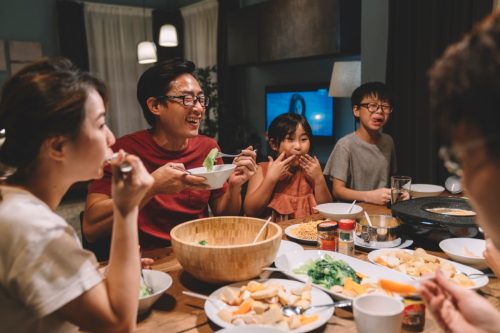
Asking people about how their day at work or school was may elicit nothing more than a one-word answer like "fine" or "good." With that in mind, Paul Osincup, public speaker and humor strategist, suggests getting them to tell you about something funny that happened during the day instead.
"The key is to ask the question every night. The first couple of times might catch them by surprise, but then they'll start looking for the humor in their days to report back," he shares. "The more the family looks for levity, the more likely they are to find it."
2
"What's one act of kindness you witnessed or experienced today?"
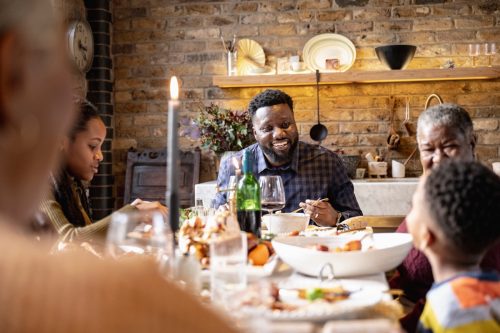
This is another retrospective question regarding the day that "digs a little deeper into the surface level conversation," Olivia Dreizen Howell, clinical hypnotherapist and certified life coach, tells Best Life.
Asking someone to recall one act of kindness they witnessed or experienced that day "promotes empathy, compassion, and reflection on the importance of kindness in everyday life, fostering a supportive and caring family environment," according to Howell.
"I love that this question also includes a conversation about positive action in our community," she adds.
3
"What's one thing that made you smile today?"

In the same vein, asking someone to simply share one thing that made them smile that day can put the entire table in a better mood.
"These questions allow each family member to share a positive moment or surprising event from their day," Claire Law, relational psychotherapist, teacher, and senior contributor at Four Minute Books, explains.
"For example, a child may beam while recounting getting a compliment from their teacher, giving parents a window into that confidence-boosting experience," Law says. "Or mom might reveal an unexpected meeting disrupted her workday, providing helpful context if she seems frazzled during dinner."
RELATED: Look for These 5 Body Language Signs to Avoid a Family Fight, Therapists Say.
4
"What's something new you tried today, and would you try it again?"

It's important to get a look into your family's personal growth, too. Kelly Mynatt, board-certified behavior analyst and mom life coach, recommends asking something more open-ended like, "What's something new you tried today, and would you try it again?" This can encourage family members to share both their experiences and feelings.
"Discussing personal achievements or challenges can inspire support and collective problem-solving, which is essential for nurturing a supportive home environment," Mynatt adds.
5
"What's a random fact you've discovered recently?"

Rory Adams, party planner, TV writer, and consultant, says one of his go-to moves during family dinners is prompting everyone to share a random fact they've learned recently.
"Those utterly fascinating yet useless nuggets of trivia are guaranteed to pique imaginations," he says. "It celebrates our innate sense of wonder while providing a low-stakes way for all ages to mentally engage and bond over the pure fun of learning something new together."
6
"What's something you're looking forward to next week?"

Don't just look backward: Ask about the future and let everyone share something they're positively anticipating for the next week.
"Looking ahead builds excitement while giving the family unit opportunities to lend encouragement and make plans to enable each other's upcoming ambitions or events," Law explains.
7
"If you could travel anywhere in the world, where would you go?"

You could also get a little more creative with open-ended questions that "provide an insightful window into each person's underlying interests, values, and personality quirks," Law says.
Take travel, for instance.
"Where they would visit internationally could highlight a love of history, cuisine, or architecture," she notes.
RELATED: 185 Fun Questions to Ask in Absolutely Any Situation.
8
"If you could solve one world problem, what would it be?"

Or maybe you want to tackle bigger, more philosophical questions. These types of questions, like, "If you could solve one world problem, what would it be," provide insight into the issues that are resonating with different family members, according to Law.
"They also encourage developing critical thinking skills while giving a forum for working through difficulties as a supportive team," she says.
9
"Who is someone you admire and why?"
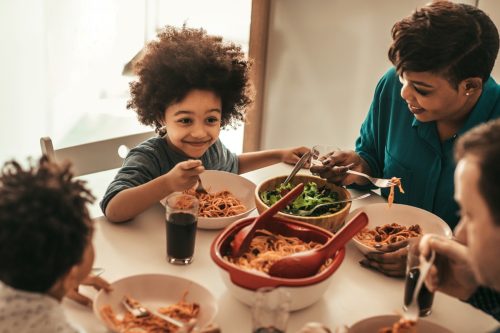
Another way to gain insight into each individual family member is by asking them about someone they admire, which can allow you to learn about their "personal heroes, values, and sources of inspiration," Law says.
"Hearing why a child looks up to a certain activist or why a parent admires a pivotal inventor can spark fascinating discussions about ethics, overcoming adversity, and finding one's purpose in life through role models," she shares.
10
"If you could have any superpower, what would it be and how would you use it?"
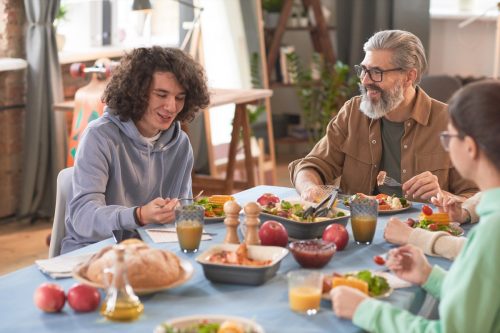
It's OK to get a little silly with your family dinner questions, too—there are no rules! But you may find that even the fun topics can create deeper conversation, as Howell explains.
"Talking about our desired superpowers is actually a discussion about goals, hopes, and dreams, and can lead to a lot of creative answers," she says. "The question encourages imaginative thinking, and fosters playful discussion about personal strengths and values."
11
"Would you rather be able to talk to animals or read minds?"
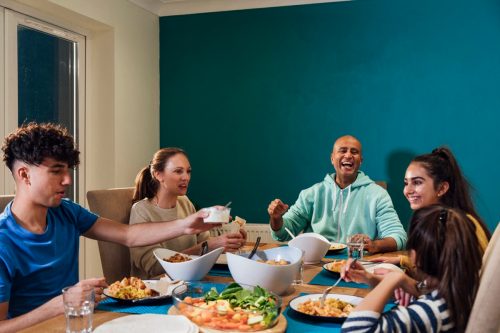
Along the same lines, asking a low-stakes either-or question can "provide laughs and entertainment value while gently revealing each person's quirky personality leanings through their choices," Law says.
"Animated debates about mind-reading morality or the pros/cons of living in another era can become delightfully spirited yet harmless family fun," she suggests.
12
"Sweet or salty snacks? Beach vacation or mountain adventure?"

Rapid fire, would-you-rather questions can also help facilitate fun and easy debates at the dinner table, according to Law. Which of your family members prefer sweet snacks over salty ones? Or who would rather go on a beach vacation instead of a mountain adventure?
"Taking opposing sides on inconsequential preferences fosters a lively spirit of friendly competition and back-and-forth banter," she says. "These snackable topics can become unexpectedly impassioned yet jovial as family members dispute the merits of their innocent stances through dramatic rhetoric and playful verbal jousting."
13
"What movie should we watch next?"

Dinner time is also a good time to discuss other opportunities for the family to gather together. For instance, maybe your family does movie nights (or wants to start doing them!). Get everyone talking about the next film you should watch, Sal Raichbach, PsyD, licensed therapist and chief clinical officer at Haven Health Management, recommends.
"Each person can share their favorite movie genres or actors, and then take turns suggesting a movie for the next family night," he says. "It's a great way to discover new movies and spend quality time together as a family."
RELATED: 23 Great TV Shows to Watch as a Family.
14
"If you were in charge of cooking dinner for the family today, what would you make?"
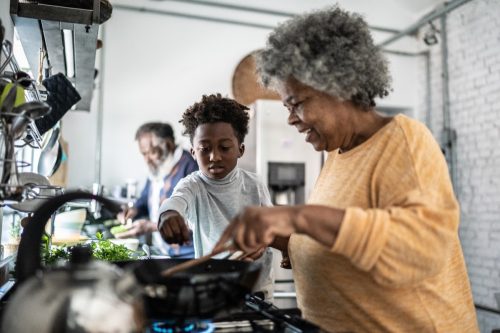
Why not get more direct about your family dinners, too? Ask anyone who didn't cook what they would have made if they had been in charge of doing so, Michael Kane, MD, board-certified psychiatrist and chief medical officer at the Indiana Center for Recovery, advises.
"This topic can bring out the inner chef in everyone," Kane says, adding that food is "alway a great conversation starter."
"Discussing different dishes can lead to recipe sharing and maybe even a fun family cook-off," he notes. "It's also a great way to learn about each other's favorite foods and cooking styles, which can come in handy for planning future family meals."
15
"What's a new family tradition we could start?"

If you're looking for more ways your family can connect, you can also make that a conversation for the dinner table.
"Getting people to propose new potential family traditions helps reinforce and nurture the family's unique identity, shared experiences, and special bond," Law shares.





















